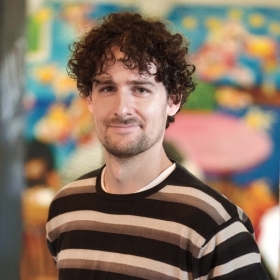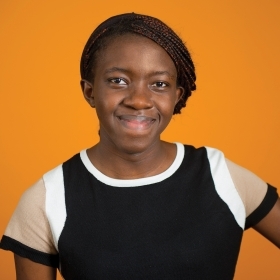Photo by Richard Howard
How long has Oscar Fernandez been a math teacher? Pretty much all his life.
“I remember in fourth grade having a bunch of kids crowding around me because I was the best at long division,” he says. “I would do long division of big numbers and do it fast. Even from a very early age, I have memories of helping students. Throughout high school, I was a tutor. When I got to college, I was a teaching assistant.”
Today, Fernandez is an assistant professor of mathematics at Wellesley. Last fall, he published a well-reviewed book, Everyday Calculus: Discovering the Hidden Math All Around Us, which reveals the calculus concepts hidden throughout a typical day.
“One of the things I love about teaching is that it really forces you to know the concepts in and out,” he says. “Every student has a particular way of thinking about something, so it forces me to know how to express the concepts in very different, yet equivalent, ways.”
This flexible approach to pedagogy has characterized Fernandez’s work since he joined the faculty in 2011. In 2012, he collaborated with Stanley Chang, professor of mathematics, to start the Wellesley Emerging Scholars Initiative (WESI) to encourage persistence and help underrepresented students complete their calculus courses. The program is optional and not for credit (“They get food,” laughs Fernandez). It uses problem-based learning to help students work collaboratively. They engage with challenging problems in small groups, with faculty available to provide informal mentoring.
WESI, says Fernandez, “has been really successful in terms of grades for students, and in terms of other metrics like self-reporting attitudes toward math and confidence. We’ve even heard from other faculty who teach these students. They’ll drop by and tell us, ‘So-and-so was really raising her hand this morning, and she was answering questions.’”
‘One of the things I love about teaching is that it really forces you to know the concepts in and out.’
—Oscar Fernandez
After its launch, the program received three years of funding from the Mathematical Association of America, which ends this spring. Happily, says Fernandez, “the provost has generously agreed to institutionalize the program going forward. The budget is small, yet it has a big impact. It’s a huge return on investment.”
In fall 2015, WESI was named a “Bright Spot in Hispanic Education” by the White House Initiative on Educational Excellence for Hispanics, which honors programs designed to close the achievement gap for Hispanic students.
Fernandez, the son of Cuban immigrants, was a first-generation college student. He holds a B.A. and B.S. from the University of Chicago and a Ph.D. from the University of Michigan.
“My father was a cab driver. He passed away when I was about 10,” Fernandez says. “My mother is a nursing assistant. I come from a family of very curious people. There were always questions going back and forth, and interesting discussions on a lot of things. They were not highly educated parents, but they were highly intrigued by the world parents. That’s where I got some of my habit of asking why, why, why.”
By making challenging problems intriguing, WESI aims to turn the remedial model of teaching underrepresented students on its head.
“There’s a lot of research about the benefits of making programs not remedial. Maybe we shouldn’t offer remediation up front. Maybe we should challenge students first,” says Fernandez. “Whether [underrepresented students] are racial minorities or from low economic backgrounds, you already feel like you’re an outcast in some sense, and here you are being told that you need remediation. It’s a double blow. If you challenge students, that tends to generate engagement. You get buy-in. Then, if they do need remediation, it’s just part of the process. It’s not the focus. I really think that’s key to the success of the program.”
That, and asking why.







We ask that those who engage in Wellesley magazine's online community act with honesty, integrity, and respect. (Remember the honor code, alums?) We reserve the right to remove comments by impersonators or comments that are not civil and relevant to the subject at hand. By posting here, you are permitting Wellesley magazine to edit and republish your comment in all media. Please remember that all posts are public.